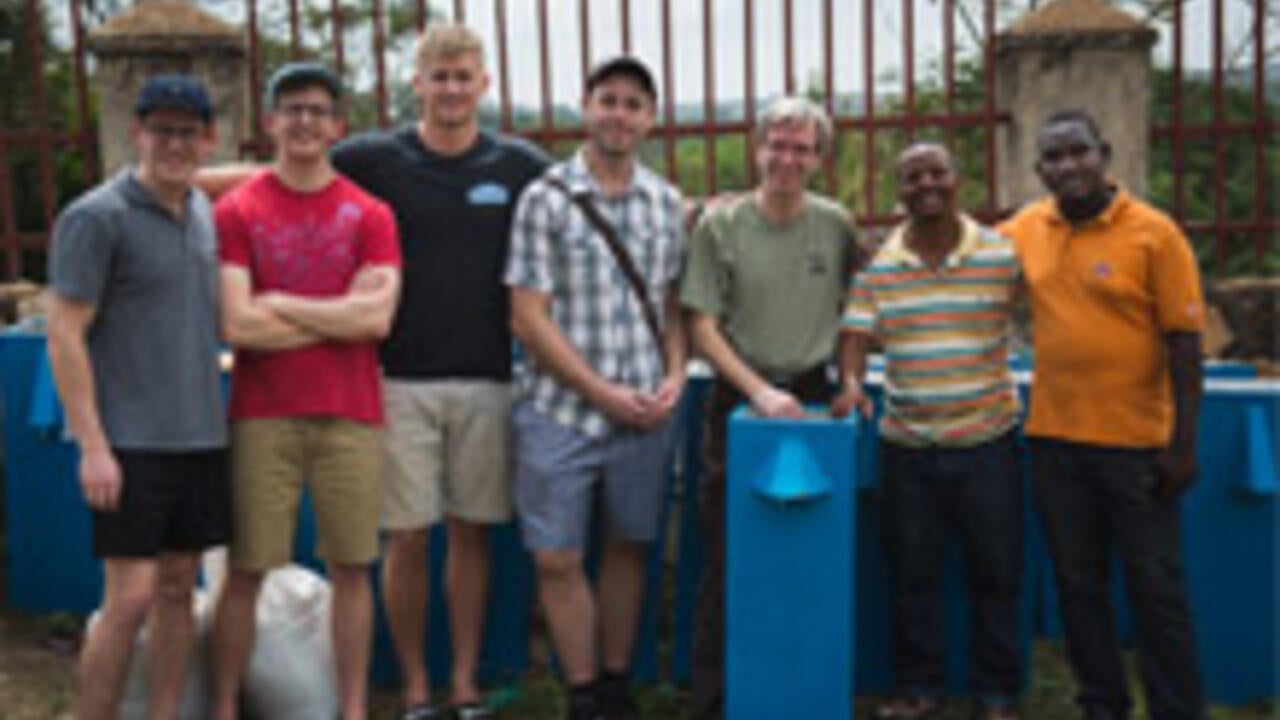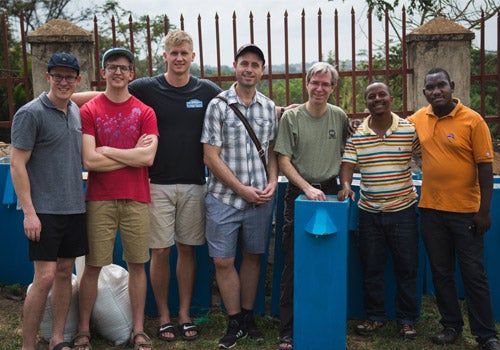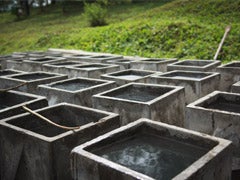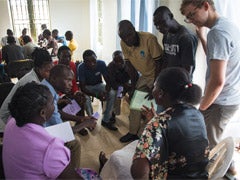
Alumni work with Ugandans to increase access to safe drinking water
Waterloo graduates are helping to bring low-cost, environmentally friendly water filters to communities in Africa

Waterloo graduates are helping to bring low-cost, environmentally friendly water filters to communities in Africa
By Nicole Bennett University Relations
From left to right: Waterloo graduates Spencer Kelly, Ben Wiseman, Aleks Poldma, Sandy McLachlan and Bruce Taylor, and Community Health Agents Brian Arimpa and David Iga
According to the United Nations, an estimated 748 million people worldwide remain without access to an improved source of water. As developing countries grapple with the lack of clean drinking water for millions of their citizens, a few Waterloo alumni are working hard to implement filtration technology that has been used for hundreds of years.
Waterloo graduates Aleks Poldma, Spencer Kelly, Ben Wiseman (BASc ’14, Mechanical Engineering), Sandy McLachlan (BSc ’10, Biomedical Science) and Bruce Taylor (BASc ’89, Chemical Engineering) traveled to Uganda in early February where they ran a weeklong workshop for community leaders on the function, selling and marketing of biosand water filters.
Poldma, Kelly and Wiseman work at Hydrated World, an apparel company founded during an Enterprise Co-op term during their studies. It provides someone with access to one litre of safe water per day for 25 years, for every item purchased. In partnership with the East-African based Safe Water Project, an initiative founded by Taylor through his local engineering firm Enviro-Stewards, Hydrated World helps fund building materials for biosand filters and trains local community leaders on how to build and use them.
A biosand filter, which uses technology that has been around for hundreds of years, purifies water by cultivating a biolayer of microorganisms that eats pathogens. The water also passes through filtration sand and gravels to eliminate solids. The low-tech filter has no moving parts, requires no maintenance and does not use any chemicals. Materials for the biosand filters can be found locally and they last 25 to 30 years, making them more cost effective and environmentally friendly than other methods of purifying water such as burning charcoal or wood.


Development is a key philosophy to both Hydrated World and Enviro-Stewards. “It’s set up to teach locals how to build these filters themselves and then how to sell them so that it’s a sustainable business,” says Poldma on the Safe Water Project.
“We’re working on a business model that teaches skills, which I think is much more compelling than giving things away,” adds Poldma.
After teaching 47 Community Health Agents during a February workshop in Uganda, Poldma and Kelly traveled to Kenya for a week to participate in the African Biosand Filter Implementers Network (ABINET) conference, giving a presentation on behalf of Hydrated World.
Hydrated World began as a venture pursued by Poldma and Kelly through the Enterprise Co-op program, run through the Conrad Business, Entrepreneurship and Technology Centre. After working several co-op terms with large corporations, Poldma and Kelly wanted to create their own business, with a goal to effect positive change on the world.
Through the director of Enterprise Co-op Wayne Chang, Poldma and Kelly met Tania Del Matto, the director of Waterloo’s social enterprise incubator Greenhouse. Del Matto connected the Hydrated World team with local engineer Bruce Taylor, launching their collaboration with the Safe Water Project. Taylor also hired Poldma and Kelly to work at his Elmira-based engineering firm Enviro-Stewards.
“We’re all very passionate about what we’re doing, especially after this trip. We’ve further solidified the fact that what we’re doing is good and we want to keep going on these trips and being involved in the Safe Water Project,” says Poldma.
In honour of UN World Water Day on March 22, the University of Waterloo will co-host an event with Wilfrid Laurier University, showcasing water research at both universities. The theme of this year’s event is wastewater, with experts discussing the reduction and reuse of wastewater. The Water Institute at Waterloo unites cutting-edge water research from all six of the University’s faculties, with a goal to become a global leader in the sustainable management of water resources.

Read more
City of Kitchener partners with United College's GreenHouse to drive youth-led climate action with $64,000 in microgrants from Bloomberg Philanthropies

Read more
GreenHouse awards $10,000 to student ventures and changemakers aiming to transform livelihoods within disadvantaged communities

Read more
Meet the five exceptional graduate students taking the convocation stage as Class of 2024 valedictorians
The University of Waterloo acknowledges that much of our work takes place on the traditional territory of the Neutral, Anishinaabeg, and Haudenosaunee peoples. Our main campus is situated on the Haldimand Tract, the land granted to the Six Nations that includes six miles on each side of the Grand River. Our active work toward reconciliation takes place across our campuses through research, learning, teaching, and community building, and is co-ordinated within the Office of Indigenous Relations.